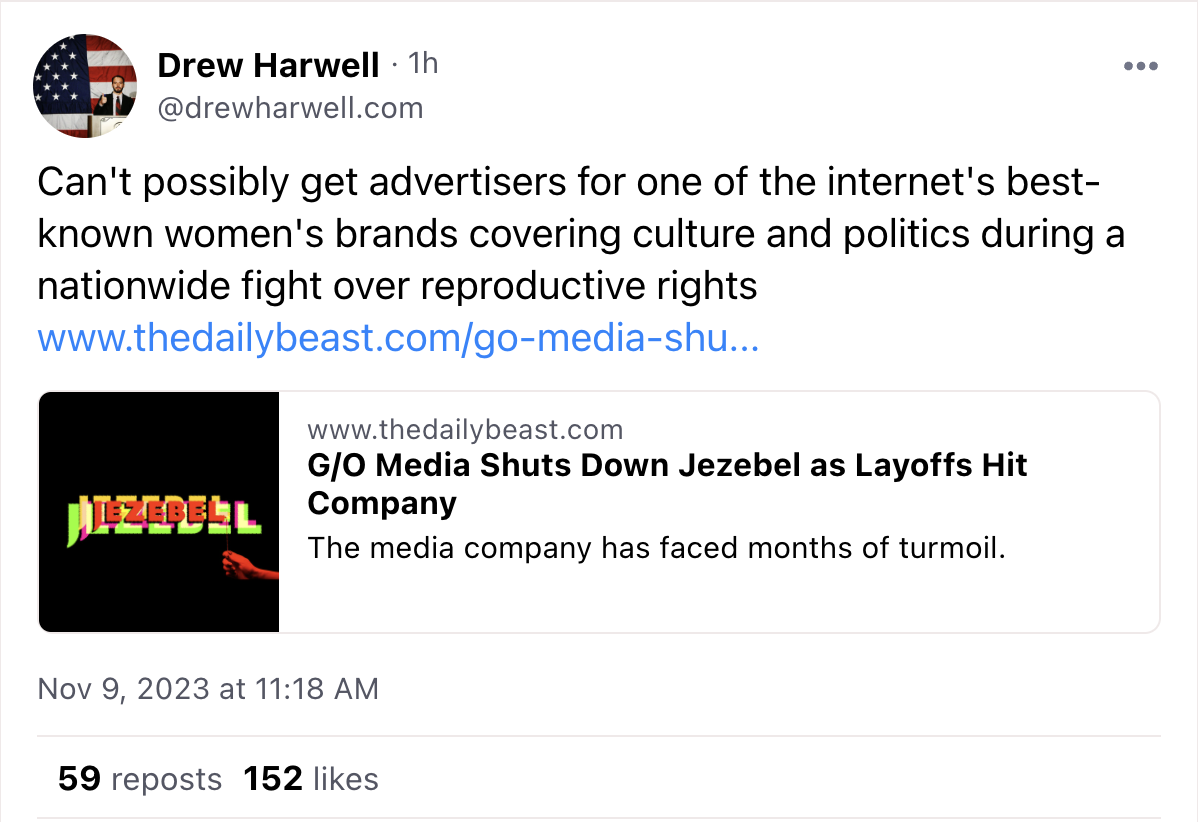
“Disillusioned by the state of American women’s media, I was given the once-in-a-lifetime opportunity to create and oversee a women’s-media entity‚ in this case, a Web site,” Anna Holmes, the founder of Jezebel, wrote for The New Yorker on November 4. “I imagined it as one with a lot of personality, with humor, with edge. I wanted it to combine wit, smarts, and anger, providing women — many of whom had been taught to believe that ‘feminism’ was a bad word or one to be avoided — with a model of critical thinking around gender and race which felt accessible and entertaining.”
Jezebel has been up for sale for a couple of weeks. On Thursday, Jim Spanfeller, CEO of Jezebel’s parent company G/O Media, said in a memo to staff that the site had not found a buyer and that “we are making the very, very difficult decision to suspend Jezebel.”
In response to a question about why G/O Media says Jezebel is “suspended” rather than “shut down,” G/O Media head of corporate communications Mark Neschis told me in an email, “The hope is that G/O Media might still find a buyer, a partner, or enough advertiser support to bring it back fully.”
Jezebel launched in May 2007 under the Gawker umbrella. After Gawker filed for bankruptcy in 2016 following Hulk Hogan’s sex tape lawsuit (a lawsuit bankrolled in part by billionaire Peter Thiel), Univision acquired all the Gawker Media brands except for Gawker. In 2019, they were sold to equity firm Great Hill Partners and made into a new company, G/O Media, under Spanfeller. Prior to Gawker’s bankruptcy, and in the heyday of digital media, Jezebel lived up to Holmes’s vision. By December 2007, it was receiving 10 million monthly pageviews; by June 2009, 25 million. It was parodied on 30 Rock (Liz Lemon: “It’s this really cool feminist website where women talk about how far we’ve come and which celebrities have the worst beach bodies”). “I really despise mainstream feminism,” Moe Tkacik, the site’s first features editor and one of its earliest writers, told The Guardian in 2017, but “Jezebel was part of bringing feminism into the mainstream.”For me, one of the site’s most memorable stories was Jia Tolentino‘s 2016 interview with a woman who had an abortion at 32 weeks of pregnancy after finding out her fetus would not survive outside the womb. The site has continued its abortion coverage, with near-daily stories in recent months.
“Their urgent, breakthrough coverage of reproductive rights in this post-Roe era, as well as other key issues core to modern women, affirmed the brand’s storied legacy as the website that changed women’s media forever,” Spanfeller wrote in his memo. “Unfortunately, our business model and the audiences we serve across our network did not align with Jezebel’s.”
News: G/O Media is "suspending publication of @Jezebel," C.E.O. Jim Spanfeller emails staff: pic.twitter.com/stQVfocMPV
— Ben Mullin (@BenMullin) November 9, 2023
Jezebel’s editorial staffers have been laid off and G/O Media is further “restructuring” its other editorial teams, Spanfeller wrote, resulting in a loss of 23 jobs in total. Jezebel’s former editor-in-chief Laura Bassett, who left the company in August citing poor working conditions for staff and is one of several EICs to have left G/O in recent months, listed seven Jezebel jobs lost. G/O Media said the other 16 eliminated positions are “spread across all sites.” (Jezebel has been operating without an editor-in-chief since Bassett’s departure.)
The brilliant staff laid off today, all of whom I love and respect, in no particular order: @l_tousignant @SusanRinkunas @AudraHeinrichs @kylietcheung @caitlinrcruz @kady_ruth @RichJuz
— Laura Bassett (@LEBassett) November 9, 2023

Easy to blame Spanfeller, a moron, but this is also a VERY classic private equity "gameplan": Buy a thing, realize you have no idea how to grow it or even not ruin it, shut it down. RIP Jez, my first favorite website.
https://t.co/p6InX5PIRB— Megan Greenwell (@megreenwell) November 9, 2023

Crazy that jezebel lasted as long as it did, given the seemingly incalculable number of media outlets that have launched and collapsed since we founded it
had not read it in years until Travis & Taylor. Their Tayvis coverage has been hilarious & made me feel 29 again. https://t.co/NmJUc595Ou
— moe tkacik (@moetkacik) November 9, 2023
WHAT A TIME TO BE ALIVE pic.twitter.com/DU6w0qkNj0
— (@dodaistewart) November 9, 2023
Today is yet another really rough day in media; dozens of my Vice colleagues are being laid off globally and we just got news that Jezebel, where I worked for years, is being shut down.
— Anna Merlan (@annamerlan) November 9, 2023
Plausible buyer at the right price. They want to sell brand & back catalog. They're going to want a lot of money. You cld run it at a reasonable profit. But that won't merit a high sale price. They think better to mothball for later sale/auction.
— Josh Marshall (@joshtpm) November 9, 2023